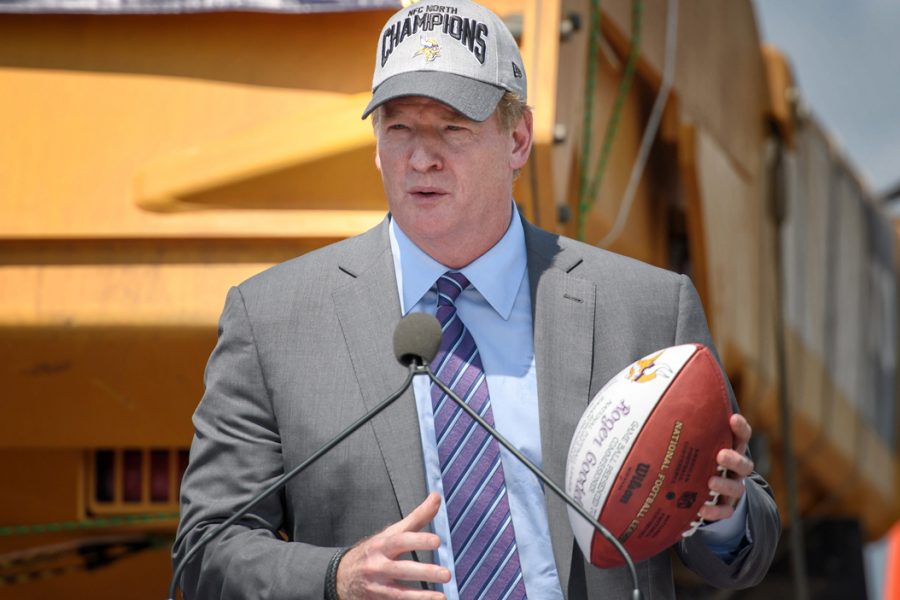The National Football League, long the juggernaut of the network television world, seems to have lost its ability to consume Americans’ weekends.
The Super Bowl has had the highest Nielsen ratings of any TV program every year in recent memory. Last year’s viewership topped 110 million, making the game the third-highest rated program of all time.
Fox, NBC, CBS and ESPN collectively dish out $7 billion annually to broadcast NFL games because football has long been a surefire way to get people to tune in.
But ratings are down about 10 percent in comparison to this time last year.
There have been many excuses as to why fewer people are watching the games. The NFL has claimed that the divisive and endlessly entertaining presidential election has robbed viewership as more people are ostensibly interested in Trump’s latest hijinks than an early season football game.
Or, perhaps the increased availability of alternative forms of entertainment, including programs offered on 400-plus cable channels or Netflix, hold our attention more than games that take 3 hours and are punctuated by dozens of commercials for beer, trucks and erectile dysfunction pills.
Maybe the anger surrounding Colin Kaepernick’s national anthem protests have led many of the NFL’s bread and butter demographic — middle-aged white men — to tune out in a boycott of the league.
Whatever the reason may be, I have absolutely no sympathy for the NFL’s plight, and neither should you. The NFL has done nothing but court apathy for the actual game of football.
To call the NFL’s management “sketchy” is a dramatic understatement. The league has been compared and tied to Big Tobacco in its handling of huge ethical issues, such as player safety. For years and years, pro football executives covered up information that linked the game to chronic traumatic encephalopathy, or CTE, a neurological disease that results from repeated head trauma, like concussions.
The documentary “League of Denial,” which details the discovery of the link and the resulting obfuscation by the NFL, was supposed to air on the popular sports network ESPN. However, after pressure by the league, which allows the network to broadcast its prime-time Monday Night Football games, the network declined to show the film. Instead, it debuted on the considerably less-watched PBS. Fittingly, the NFL tried to bury a documentary that criticized its opacity.
The league has also come under fire for its handling of domestic violence issues. Ray Rice was originally suspended for just two games due to allegations of domestic violence. After graphic video evidence surfaced of him punching his wife in an Atlantic City casino, the public outcry was so great that the league revised its punishment to an indefinite suspension.
Although front office officials such as Commissioner Roger Goodell initially denied it, they had access to the tape before handing down the initial punishment, which incited public attacks for handling the entire domestic violence question with an improper degree of respect. An incredibly similar situation is currently unfolding with the New York Giants’ kicker Josh Brown, as the team and league reportedly knew about his history of abusing his wife. Did the league learn its lesson? Nope. Yet again, it did nothing.
So why in the world would I care about a 10 percent drop in viewers and decreased ad revenue for a resolutely amoral organization?
I cannot deny it — I love the game of football. I played for eight years and am proud my teammates considered me a hard hitter. I follow the results of my favorite team, the Washington Redskins, every weekend and watch their games whenever possible. On Sunday nights, my roommates and I all get together to watch the prime-time game broadcast on NBC. But my interest is waning.
The game has become corporatized to an unpalatable degree. I don’t like being inundated with the same commercials on an endless loop. I don’t like sitting around for three hours watching the aforementioned commercials for a measly 11 minutes of actual game play. I don’t like seeing the hard hits I used to love now that I know these players are destroying their bodies and minds for the viewing public’s enjoyment, acting as modern gladiators.
And I definitely don’t like the idea that all the money that comes from those commercials, from those hard hits and from the endless stream of commercial entertainment tied to the NFL has pushed its management to cover up abuse and violence in order to keep the profits flowing in.
Maybe this is the beginning of the end for the NFL. More and more players are retiring early in light of the increased knowledge of the game’s health risks. Fewer youth are picking up the game as worried parents are shepherding their children to safer sports such as baseball and basketball.
If we’ve already passed the high water mark of the NFL’s cultural influence, then so be it. I’m playing the world’s smallest violin — albeit hypocritically — with my Redskins jersey on.


